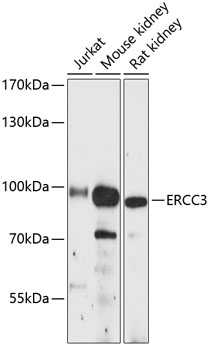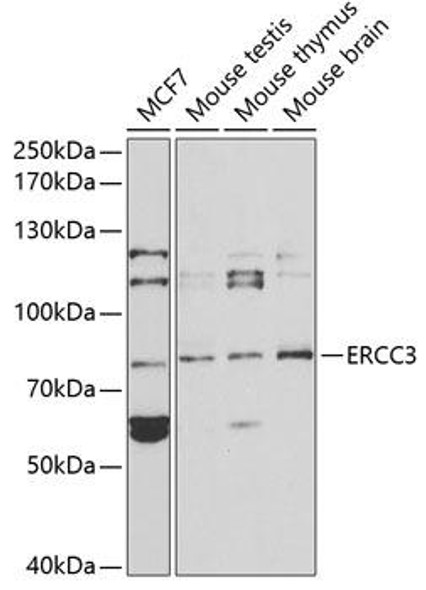Epigenetics & Nuclear Signaling Antibodies 1
Anti-ERCC3 Antibody (CAB12702)
- SKU:
- CAB12702
- Product Type:
- Antibody
- Reactivity:
- Human
- Reactivity:
- Mouse
- Reactivity:
- Rat
- Host Species:
- Rabbit
- Isotype:
- IgG
- Antibody Type:
- Polyclonal Antibody
- Research Area:
- Epigenetics and Nuclear Signaling
Description
| Antibody Name: | Anti-ERCC3 Antibody |
| Antibody SKU: | CAB12702 |
| Antibody Size: | 20uL, 50uL, 100uL |
| Application: | WB |
| Reactivity: | Human, Mouse, Rat |
| Host Species: | Rabbit |
| Immunogen: | Recombinant fusion protein containing a sequence corresponding to amino acids 512-782 of human ERCC3 (NP_000113.1). |
| Application: | WB |
| Recommended Dilution: | WB 1:500 - 1:2000 |
| Reactivity: | Human, Mouse, Rat |
| Positive Samples: | Jurkat, Mouse kidney, Rat kidney |
| Immunogen: | Recombinant fusion protein containing a sequence corresponding to amino acids 512-782 of human ERCC3 (NP_000113.1). |
| Purification Method: | Affinity purification |
| Storage Buffer: | Store at -20'C. Avoid freeze / thaw cycles. Buffer: PBS with 0.02% sodium azide, 50% glycerol, pH7.3. |
| Isotype: | IgG |
| Sequence: | CPMS PEFY REYV AIKT KKRI LLYT MNPN KFRA CQFL IKFH ERRN DKII VFAD NVFA LKEY AIRL NKPY IYGP TSQG ERMQ ILQN FKHN PKIN TIFI SKVG DTSF DLPE ANVL IQIS SHGG SRRQ EAQR LGRV LRAK KGMV AEEY NAFF YSLV SQDT QEMA YSTK RQRF LVDQ GYSF KVIT KLAG MEEE DLAF STKE EQQQ LLQK VLAA TDLD AEEE VVAG EFGS RSSQ ASRR FGTM SSMS GADD TVYM EYHS SRSK APSK HVHP LFKR FRK |
| Gene ID: | 2071 |
| Uniprot: | P19447 |
| Cellular Location: | Nucleus |
| Calculated MW: | 89kDa |
| Observed MW: | 89kDa |
| Synonyms: | ERCC3, BTF2, GTF2H, RAD25, TFIIH, TTD2, XPB |
| Background: | This gene encodes an ATP-dependent DNA helicase that functions in nucleotide excision repair. The encoded protein is a subunit of basal transcription factor 2 (TFIIH) and, therefore, also functions in class II transcription. Mutations in this gene are associated with Xeroderma pigmentosum B, Cockayne's syndrome, and trichothiodystrophy. Alternative splicing results in multiple transcript variants. |
| UniProt Protein Function: | XPB: ATP-dependent 3'-5' DNA helicase, component of the core- TFIIH basal transcription factor, involved in nucleotide excision repair (NER) of DNA and, when complexed to CAK, in RNA transcription by RNA polymerase II. Acts by opening DNA either around the RNA transcription start site or the DNA damage. One of the 6 subunits forming the core-TFIIH basal transcription factor which associates with the CAK complex composed of CDK7, CCNH/cyclin H and MNAT1 to form the TFIIH basal transcription factor. Interacts with PUF60. Interacts with ATF7IP. Interacts with Epstein-Barr virus EBNA2. Belongs to the helicase family. RAD25/XPB subfamily. |
| UniProt Protein Details: | Protein type:Helicase; DNA repair, damage; EC 3.6.4.12; Transcription factor Chromosomal Location of Human Ortholog: 2q21 Cellular Component: nucleoplasm; holo TFIIH complex; nucleus Molecular Function:protein C-terminus binding; DNA-dependent ATPase activity; GTP binding; ATPase activity; dATP binding; 3'-5' DNA helicase activity; protein N-terminus binding; peptide binding; transcription factor binding; protein kinase activity; ATP-dependent DNA helicase activity; RNA polymerase subunit kinase activity; protein binding; DNA binding; damaged DNA binding; ATP binding Biological Process: transcription from RNA polymerase II promoter; DNA topological change; viral reproduction; apoptosis; positive regulation of apoptosis; positive regulation of viral transcription; protein amino acid phosphorylation; regulation of gene expression, epigenetic; protein localization; mRNA capping; UV protection; negative regulation of gene expression, epigenetic; transcription-coupled nucleotide-excision repair; nucleotide-excision repair, DNA damage removal; response to UV; transcription initiation from RNA polymerase II promoter; hair cell differentiation; nucleotide-excision repair, DNA incision; RNA elongation from RNA polymerase I promoter; transcription from RNA polymerase I promoter; termination of RNA polymerase I transcription; DNA repair; nucleotide-excision repair, DNA duplex unwinding; nucleotide-excision repair; RNA elongation from RNA polymerase II promoter; response to hypoxia; gene expression; positive regulation of transcription from RNA polymerase II promoter; response to oxidative stress; transcription initiation from RNA polymerase I promoter Disease: Trichothiodystrophy 2, Photosensitive; Xeroderma Pigmentosum, Complementation Group B |
| NCBI Summary: | This gene encodes an ATP-dependent DNA helicase that functions in nucleotide excision repair. The encoded protein is a subunit of basal transcription factor 2 (TFIIH) and, therefore, also functions in class II transcription. Mutations in this gene are associated with Xeroderma pigmentosum B, Cockayne's syndrome, and trichothiodystrophy. Alternative splicing results in multiple transcript variants. [provided by RefSeq, Dec 2014] |
| UniProt Code: | P19447 |
| NCBI GenInfo Identifier: | 119541 |
| NCBI Gene ID: | 2071 |
| NCBI Accession: | P19447.1 |
| UniProt Related Accession: | P19447 |
| Molecular Weight: | 80kDa |
| NCBI Full Name: | General transcription and DNA repair factor IIH helicase subunit XPB |
| NCBI Synonym Full Names: | ERCC excision repair 3, TFIIH core complex helicase subunit |
| NCBI Official Symbol: | ERCC3 |
| NCBI Official Synonym Symbols: | XPB; BTF2; TTD2; GTF2H; RAD25; TFIIH |
| NCBI Protein Information: | general transcription and DNA repair factor IIH helicase subunit XPB |
| UniProt Protein Name: | TFIIH basal transcription factor complex helicase XPB subunit |
| UniProt Synonym Protein Names: | Basic transcription factor 2 89 kDa subunit; BTF2 p89; DNA excision repair protein ERCC-3; DNA repair protein complementing XP-B cells; TFIIH basal transcription factor complex 89 kDa subunit; TFIIH 89 kDa subunit; TFIIH p89; Xeroderma pigmentosum group B-complementing protein |
| Protein Family: | Probable DNA repair helicase |
| UniProt Gene Name: | ERCC3 |
| UniProt Entry Name: | ERCC3_HUMAN |







